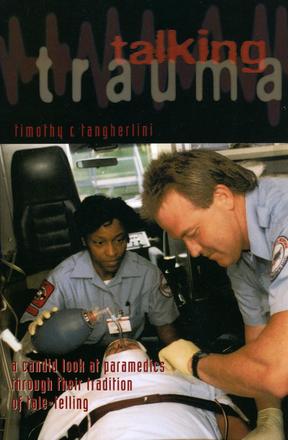
A candid look at paramedics through their tradition of storytelling
Description
“Man, I've seen, believe it or not, a head-on accident in the parking lot of a Macy's sale. What do they have, those white sales, is that what they have? The parking lot was completely barren except these two cars that hit each other head on. This little old lady and some other idiot. How do you do that?! A barren parking lot! Completely empty, morning, nobody there, and somehow they managed to hit each other head on. Well, it was just enough trauma to kill her, you know? Barely any damage but, you know, a little old lady driving a big car, a big old gnarly steering wheel and that's enough to kill an elderly person and stuff. ”
As they race to and from emergency calls, as they wait and watch, and as they administer aid to the traumatized, paramedics tell stories. Their tales disclose much about how they view their own profession. Their duties are much more complex than the dramatic portrayals that reach the living room via the television screen. This book reports what really goes on behind the scenes. The reader of Talking Trauma has a virtual front seat in the ambulance.
Here the focus is not on the mechanics of the job but rather on paramedics' work culture and their well-established storytelling tradition. The stories they tell are cynical, flip, and profane—the very antithesis of “heroic” in the romantic sense. Their narratives evince an “anti-epic” quality that intentionally trivializes the conventional immensities of pain and horror. Paramedics present the gothic as “business as usual,” and mainly their stories are intended only for the ears of other paramedics.
Their stories afford a shocking glimpse into a chaotic urban underworld where prostitution, drug abuse, assault, and murder are daily fare. Outsiders may expect their tales to be only about horrific mutilation and death. However compelling such topics may be to the layperson, the actual repertory is most often commentary on personal experience and revelation of the “why” behind the stories paramedics tell.
Talking Trauma provides an intimate look into a work culture deliberately kept hidden from public view. It is not centered on individuals the public may stereotype as streetwise, hardened caregivers but upon the stories of self-presentation by which paramedics structure past events to fit into their identity. This fascinating book reveals how storytelling equips these professionals to exert control over chaos and to withstand encounters with suffering, death, and mayhem on a daily basis.